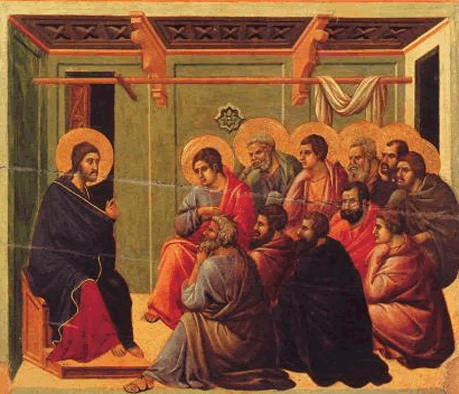 It’s easier for me to address these thoughts posted as a comment to my previous post with a new post here.
It’s easier for me to address these thoughts posted as a comment to my previous post with a new post here.
I’ll try to take a crack at it. I’m not saying I agree with all of the following, but I think it’s essentially how we got here.
How we got here (i.e. to the conclusion that oral tradition is the necessary and best explanation for the source material of the Gospels) or how we rationalize our assumption? The Gospels-Acts narrative itself leads us to expect an oral tradition between Jesus and the gospels — we are led to picture evangelist and apostolic activity as well as ordinary church members spreading the word — so I suspect oral tradition is a default assumption.
Now it is important, of course, to find evidence in the support of any hypothesis like this and your following list reminds me of several of the supporting arguments used to support it.
But without wanting to sound like a nefarious “hyper-sceptic” it is also my understanding that good method requires us to seriously evaluate counter-evidence, too. How does one raise this question without sounding like some nihilistic anti-god anti-Christ atheist who hates Christianity and everything that is good and decent in the world, all sound critical biblical scholarship and wants to see every religion wiped off the face of the earth?
I am an atheist but like Tamas Pataki I don’t know if eliminating religion would really make the world a better place any more than eradicating all insect pests would really be in humanity’s best interests. Moreover, I can’t imagine how establishing that there really were oral traditions between a Jesus event and the written gospels would make the slightest difference to me personally. I would want to learn and know more about them if we had some basis for establishing their existence.
I will omit the “must’ve” argument that tries to explain away the decades between the historical Jesus and the first gospel. Since scholars assume the HJ and they concede that the gospels were written by non-eyewitnesses much later and in a different language, they conclude that the traditions “must’ve” floated around, passed on orally for many years. That’s a circular argument at best. At worst, it’s a deus ex machina that rescues the gospels from their suspicious circumstances.
Yep, that’s the nagging doubt that obliges one to raise the question (without being a “hyper-sceptic”.) Continue reading “Evidence for Pre-Gospel Oral Traditions and Related Questions”
Like this:
Like Loading...

